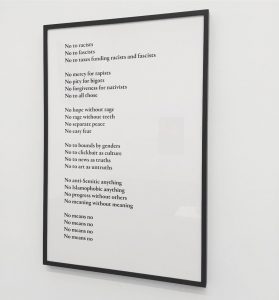
I left New York City for Berlin on the 24th of January. The days before my departure were saturated with a dissociative pain that stemmed from their proximity to the inauguration of President Trump, which took place on January 20th. Mostly I was aware of a void-like sadness. This void enveloped my singular self, everyone I loved, communities experiencing oppressions that I as a cis white woman will never be subject to, and communities that I belong to as a queer person and survivor of sexual violence. The effect was tangible in the city, between and across neighborhoods, a dull reverberation. The fact that this collective mourning was distributed unequally due to the diverse lived experiences and levels of social privilege of those affected complicated the act of articulation. I found myself and my peers falling into spells of isolation, or, conversely, dispersing articles, posts, and personal rants at a frantic pace via the constantly replenishing outlets of social media. Neither of these tactics left me with any feeling of agency or productivity: The nature of voids is that they swallow and calcify anything dynamic, leaving their subjects in a state of vertigo.
I would suggest that the election of President Trump was a traumatic event in the lives of many Americans. Or, in the same vein, that the election of President Trump re-staged, on a national scale, the racial, sexual, gendered, and otherwise hegemonic traumas that have been and are continuously being experienced by marginalized populations.
On the day of the inauguration, I went to Bluestockings, an activist space and bookstore on the Lower East Side, and sat at a table for hours. The space was full but quieter than usual. People clustered together rather than browsing the shelves. Two women next to me were talking about the idea of sustainable hope—an activist mentality that does not “burn out” but regenerates according to circumstance. “I can’t read Foucault in a class seminar right now,” one exclaimed. I related completely. At that time, the thought of going back to school after winter break, and in another country, too, seemed unimaginable to me. I remembered the sense of limitation–akin to the “defeatism” Elena Gagovska referred to in her article on ‘Trumponomics’ and the Politics of Resistance” — that permeated the Bard Annandale campus for days and weeks after Trump was elected. Classroom discourse and intellectual theorizations felt like inappropriate and depersonalizing responses to such an event. A different language was necessary, one grounded in lived experiences rather than couched in rhetoric.
That day at Bluestockings, I found a poem by Hannah Regel in one of the many zines:
“Dream 28”
I’m there everyday
Brave because I’m defining the word
By showing up
I’m merely showing up
Merely existing
I’m ready to crumble
Ready to be dismantled
Prepped and ready
I found the revolutionary quality of this poem to be its understanding of the fact that oppressive power is not something that can be resisted easily or through following systemic, theorized procedure. Resistance is a lived space that is navigated by the human body in question. Mere existence, self-definition, and regeneration are all valid responses to something which threatens the most intimate realms of people’s lives. By this I don’t mean that privileged individuals can say “I’m merely existing, and that’s radical,” because that is the same old use of memorized jargon as an excuse for not mobilizing your own social power against forces of injustice, which is not excusable and self-evidently not okay. I mean that, in order to acknowledge the emotional reality of resisting oppression and dehumanization, we must recognize that bravery can exist outside of the borders of active organizing and conventional resistance; that it is present in the creative, intimate margins of survival tactics, personal mantras, healing conversations between friends, artmaking, destabilizing realization and reassessment, and the fabric of communal space.
Now in Berlin, being physically distant from the current political climate of the USA, I feel less emotional proximity to it. It is hard for me to feel grief embodied in the same way across borders and ocean. It is a strange displacement—hearing about events occurring in your home but being unable to see them unfold and manifest—and undoubtedly one that much of the international student body of BCB has experienced.
However, I don’t think that any of our personal, political, or social selves are halted when we occupy a different cultural terrain. In my classes here I am constantly finding threads, delicate and glowing, that connect to my thoughts concerning my own country. In my Forms of Love core class taught by Tracy Colony, we have been discussing the nature of eros. What has stuck with me most from these conversations is that a relationship cannot be truly “erotic” without an acknowledgement of the lived, embodied difference that lies between subjects of desire. And isn’t eros the most important element for fostering communal spaces of empathy, which in turn enable true collective resistance? A friend of mine said something similar in an email—that he has realized that love and loving are like tending to the borders between selves. I have come to consider this to be the most tender and necessary act I can possibly strive towards, both abroad and at home.
